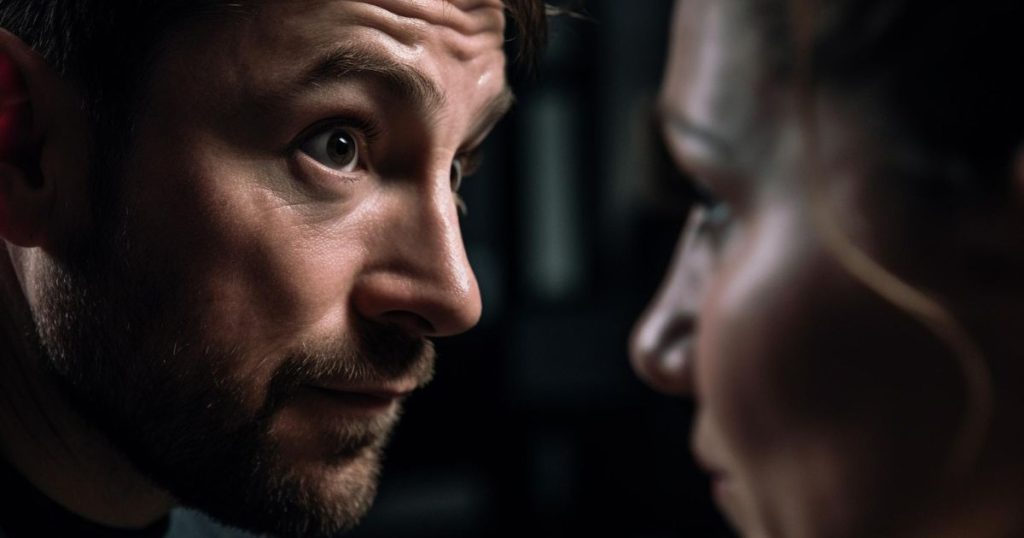The uncomfortable “I have something to tell you, but I don’t want to get involved” expression.
“He’s been asking about you again,” she said quietly. “And about your new boyfriend.”
My stomach dropped. It had been two months since I broke up with my ex.
Two months since I’d discovered he’d been cheating with Melissa from our Tuesday night league.
Two months since I’d realized he’d been using my credit card behind my back.
But somehow, he was still there. Still watching.
Still collecting information about my life like some kind of emotional detective.
The worst part? For a split second, I felt that familiar flutter of confusion.
Was this love? Did he miss me? Was there some part of him that actually cared?
Then reality hit me like a serve to the face.
This wasn’t about love, curiosity, or even “unfinished business.”
This was about something much more calculated and much more disturbing.
When a narcissistic ex keeps tabs on your love life, they’re not pining for you.
They’re not realizing what they lost. They’re not even particularly interested in you as a person.
They’re protecting their investment in the narrative they’ve created, the one where you’re the problem, they’re the victim, and your life without them is supposed to be a disaster.
Your new relationship? Your happiness? Your peace?
It’s threatening their entire story. And narcissists will go to shocking lengths to maintain their version of reality, even when they’re no longer part of yours.
Table of Contents
Narcissists Don’t Let Go, They Lose Grip

Love Was Never The Goal, Ownership Was
Here’s what I wish someone had told me when I was sitting in my car after volleyball practice, feeling irritated as I processed what Sarah had said:
Narcissists don’t love you. They own you.
At least, that’s how it feels to them.
When my ex and I were together, I thought his jealousy was a sign of passion. His need to know where I was, who I was with, and what I was doing, I mistook it for caring.
But love doesn’t interrogate you after a girls’ night out.
Love doesn’t check your phone while you’re in the shower.
Love doesn’t make you feel like you’re on trial for having lunch with a coworker.
Control does.
For six months, I lived under a microscope I didn’t even realize was there.
Every friendship was suspicious. Every conversation was analyzed. Every decision had to be approved or explained.
I wasn’t his girlfriend. I was his project.
And when you’re a narcissist’s project, they don’t just walk away when the relationship ends. They monitor their investment.
Your happiness after them? It feels like betrayal.
Your peace without them? It’s proof that they were the problem.
Your new relationship? It’s evidence that you were never broken, just trapped.
That’s why they keep watching. Not because they love you, but because they can’t accept that you were never theirs to begin with.
Your New Partner Threatens Narcissist’s Fantasy Narrative

The night I found out about Melissa, my ex didn’t just lose a girlfriend. He lost his carefully constructed story.
For months, he’d been painting me as the problem in our relationship. I was “too sensitive.” I was “too independent.” I was “too much work.”
When I discovered his cheating and his financial theft, suddenly his narrative crumbled.
But narcissists are master storytellers. They don’t just accept plot holes in their life story; they rewrite them.
So when I started dating my now-husband just six months later, my ex had a choice: admit he was a cheating thief who drove away a good woman, or find a way to make me the villain again.
Guess which one he chose?
Suddenly, I wasn’t the woman who’d been betrayed and stolen from.
I was the woman who “had someone lined up the whole time.” I wasn’t the victim of his infidelity; I was the cheater who “left him for another guy.”
He needed this story to be true. Because if it wasn’t, then he had to face the reality that I’d simply chosen happiness over his toxicity.
And that’s a reality narcissists cannot tolerate.
Your new partner isn’t just someone you’re dating. They’re walking proof that you weren’t the problem in your previous relationship.
They’re evidence that you’re capable of being loved properly, treated well, and valued consistently.
They’re living, breathing testimony that you didn’t need to be “fixed”, you needed to be freed.
That’s why your ex is still asking questions. Your new relationship isn’t just threatening narcissists’ ego; it’s destroying their entire defense system.
How Your Narcissistic Ex Collects Intel (Without Contacting You)?

Flying Monkeys in Action
Sarah wasn’t the first person to come to me with “updates” about my ex’s questions. She was just the most direct about it.
There was Mark, who casually mentioned that “someone” had been asking if I was “really serious” about my new boyfriend.
There was Jessica, who innocently wondered if I knew my ex had been “concerned” about how quickly I’d moved on.
There was even my teammate Amy, who thought she was being helpful by letting me know my ex had asked her if my new relationship was “just a rebound.”
At first, I thought these people were just being gossipy. Then I realized something more calculated was happening.
My ex had turned half our volleyball community into his personal intelligence network.
He wasn’t directly asking about me; that would look desperate. Instead, he was positioning himself as the “concerned” ex who just wanted to make sure I was “okay.”
“I hope she’s not making another mistake,” he’d say to Mark, who would then feel obligated to report back about how happy I seemed.
“I just want to make sure she’s not rebounding too fast,” he’d tell Jessica, who would then probe me about my relationship timeline.
“I worry about her judgment after everything,” he’d mention to Amy, who would then feel compelled to assess whether my new boyfriend was “good enough.”
He wasn’t asking for information. He was planting seeds of doubt and turning well-meaning friends into his surveillance team.
The scariest part? Most of them had no idea they were being manipulated.
They thought they were being helpful. They thought they were showing care. They thought they were just sharing harmless observations.
But every piece of information they gathered went straight back to someone who had no right to know anything about my life anymore.
Flying monkeys don’t always know they’re flying monkeys.
Sometimes they’re just people who’ve been convinced they’re helping.
Social Media as a Narcissist’s Surveillance Tool

Two weeks after the volleyball conversation with Sarah, I noticed something strange in my Instagram analytics.
Someone was watching every single one of my stories. Never liking. Never commenting. Never interacting.
Just watching.
I knew it was him. The timing was too perfect, and the pattern was too consistent.
He’d blocked me on everything after I’d called him out about Melissa and the credit card theft.
But that didn’t stop him from creating fake accounts or asking friends to “check up on me.”
This is the narcissist’s favorite surveillance tool: the silent watch.
They want to know everything about your life, but they don’t want you to know they’re looking.
They want the intelligence without the vulnerability of seeming interested.
They’ll watch your stories but never like your posts.
They’ll keep tabs on your relationship but never acknowledge your happiness.
They’ll monitor your success but never congratulate you on it.
It’s strategic stalking designed to keep you slightly unsettled. They want you to sense their presence without being able to prove their obsession.
The goal isn’t just information gathering. It’s psychological warfare.
They want you to feel watched.
Narcissists want you to second-guess posting that happy photo with your new partner.
They want you to wonder if that story about your promotion will “upset” them.
They want to live rent-free in your head even when they’re no longer welcome in your life.
The most twisted part? They’ll act like they don’t care about you at all while spending hours analyzing every aspect of your online presence.
They want you to believe you’re irrelevant to them while proving through their behavior that you’re still the center of their attention.
It’s the illusion of indifference combined with the reality of obsession.
And it’s designed to make you feel crazy for noticing.
What It Really Says About Narcissists?

Your Joy Is Narcissists’ Ego Injury
Six months after I’d started dating my now-husband, Sarah mentioned something that stopped me cold.
“He asked me if you seemed genuinely happy,” she said. “Like, actually happy. Not just pretending to be okay.”
The question hit me like a volleyball spike to the chest.
He wasn’t asking because he cared about my well-being. He was asking because my happiness was his worst nightmare.
Think about it: if you’re a narcissist who’s convinced yourself that your ex was “too much work,” “too demanding,” and “impossible to please,” then seeing them genuinely happy with someone else is devastating proof that you were wrong.
My joy with my husband wasn’t just my victory. It was his ego injury.
Every Instagram story of us laughing together was evidence that I wasn’t “too difficult to love.”
Every Facebook post about our weekend adventures proved I wasn’t “too high-maintenance for a normal relationship.”
Every photo of me looking peaceful and content demonstrated that I wasn’t “naturally miserable” or “impossible to satisfy.”
I was the same person he’d claimed was “too much.” But somehow, I was thriving with someone who thought I was exactly enough.
That’s not a reflection of my transformation. That’s a reflection of his failure.
A happy, stable you means they failed to “ruin” you. And for someone whose entire self-worth depends on being superior, that’s unbearable.
Your peace after them isn’t just your healing, it’s their report card. And they’re failing spectacularly.
Their Life Hasn’t Moved On

Here’s what I learned about my narcissistic ex through the volleyball gossip network: while he was busy monitoring my relationship, his own life was completely stagnant.
Same job. Same apartment. Same friend group. Same patterns.
But now he had a new obsession: proving that my happiness was temporary and his misery was my fault.
When narcissists can’t let go of surveillance, it’s not because they’re thriving. It’s because they’re stuck.
People who are genuinely moving forward don’t have time to monitor their ex’s Instagram stories.
People who are building new, fulfilling lives don’t need to send flying monkeys to gather intelligence about relationships that ended months ago.
Their need to check up on you is a massive red flag that their life hasn’t evolved past your breakup.
You’ve become their yardstick for measuring their own worth.
If you’re doing better than they are, then they’re failing. If you’re happier than they are, then they’re losing.
That’s why they can’t stop watching. You’re not just their ex, you’re their comparison point.
And right now, they’re losing the comparison badly.
Think about it: while you’re building a healthy relationship, learning to trust again, and creating genuine peace, they’re spending their emotional energy playing detective about your love life.
While you’re moving forward, they’re stuck in surveillance mode.
While you’re creating new memories, narcissists are obsessing over your old ones.
Their inability to let go isn’t romantic. It’s pathetic.
It’s evidence of emotional immaturity, deep insecurity, and a complete inability to process rejection or consequences.
Most importantly, it’s proof that they haven’t learned anything from losing you. They’re still the same person who drove you away; they’re just lonelier now.
A person who’s genuinely grown from a breakup doesn’t need to spy on their ex’s happiness.
They’re too busy creating their own.
You Don’t Owe an Audience to Your Pain

Two years later, I ran into my narcissistic ex at a volleyball tournament.
He looked exactly the same. Same clothes, same haircut, same energy.
But when he saw me with my husband, something in his face shifted. Not anger. Not jealousy.
Recognition.
He finally understood what I’d figured out months earlier: I wasn’t performing my happiness for his benefit.
I wasn’t trying to prove anything to him. I wasn’t even thinking about him anymore.
I was just living.
And that terrified him more than any revenge plot ever could have.
For two years, he’d been watching a life that had absolutely nothing to do with him.
He’d been monitoring a happiness he had no part in creating and no power to destroy.
He’d been in the audience to a show where he wasn’t even a background character.
That’s when I realized the most profound truth about narcissistic surveillance: they keep watching because they’re still hoping for evidence that you need them, miss them, or think about them.
But the moment you stop performing, even unconsciously, for their perception, their surveillance becomes meaningless.
Your love life was never their business to monitor.
Your healing was never their story to narrate.
Your happiness was never their stage to criticize or applaud.
You don’t owe them updates, explanations, or access to your growth.
You don’t owe them the satisfaction of knowing they still affect you.
You don’t owe them an audience to your pain or your joy.
Related Reads:
- 13 Savage Ways to Make a Narcissist Partner Regret Ever Losing You
- Why Dating a Narcissist Was the Best & Worst Thing That Ever Happened to Me?
- The Psychological Cost of Dating a Narcissist (And What I Want You to Know)
- Why I Stopped Dating For One Year After My Narcissistic Relationship (And Why It Worked Out So Beautifully)
- 5 Dating Rules I Created After Narcissistic Abuse (That Filter Out Toxic Men Like a Strainer)


